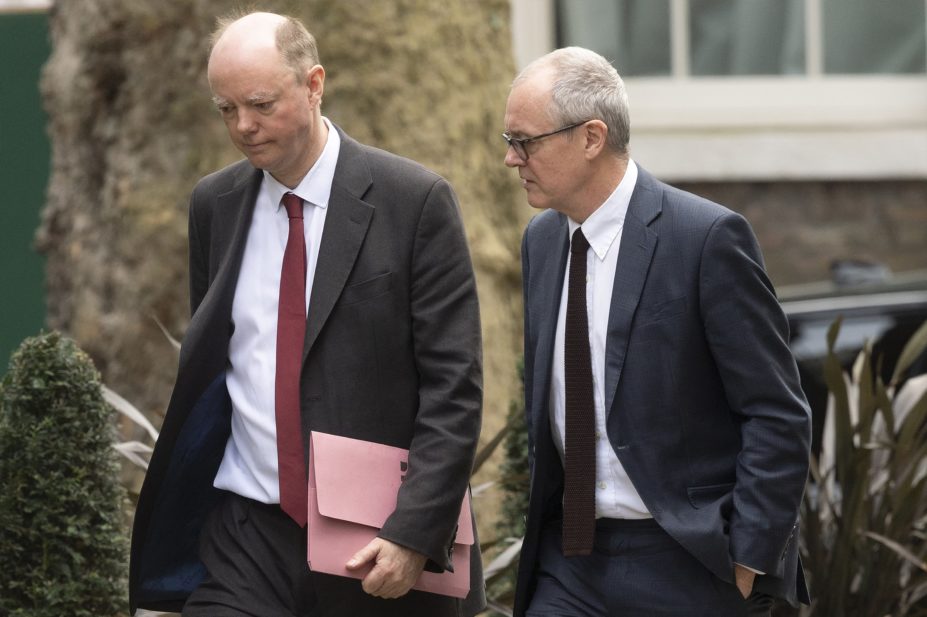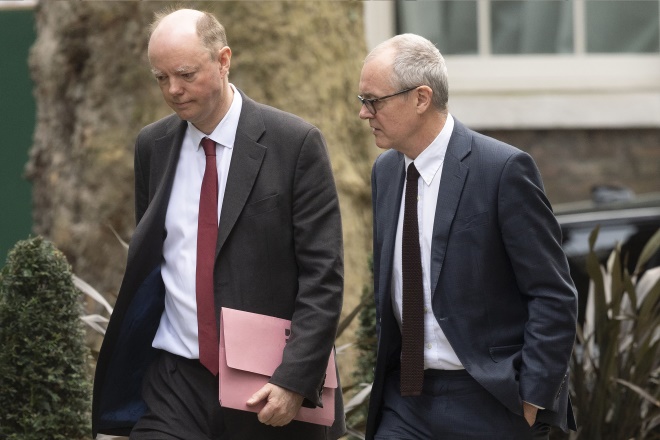
Han Yan/Xinhua News Agency/PA Images
Open access article
The Royal Pharmaceutical Society has made this article free to access in order to help healthcare professionals stay informed about an issue of national importance.
To learn more about coronavirus, please visit: https://www.rpharms.com/resources/pharmacy-guides/wuhan-novel-coronavirus

Source: Han Yan/Xinhua News Agency/PA Images
Chris Whitty (pictured left), chief medical officer for England, told the Health and Social Care Select Committee that he expected a similar level of absence from work among NHS staff to other parts of society, in the event of a COVID-19 outbreak
NHS England could redeploy staff to work in areas suffering large-scale absences as a result of a COVID-19 outbreak, pharmacy negotiators have said.
In a statement to The Pharmaceutical Journal, Alastair Buxton, director of NHS services at the Pharmaceutical Services Negotiating Committee (PSNC), said that large numbers of work absences among pharmacy staff was “a scenario that has been discussed previously with the NHS as part of pandemic planning”.
He added that if “pharmacies were forced to close due to staff absences, we expect that the NHS would step in to ensure that all available staff were strategically deployed to maintain pharmaceutical services in any given region”.
Buxton’s comments come after the government published it’s ‘Coronavirus action plan’ on 3 March 2020, which suggested that “up to one-fifth of employees may be absent from work during peak weeks” as part of a “reasonable worst-case scenario”.
Speaking to the Health and Social Care Select Committee on 5 March 2020, Chris Whitty, chief medical officer for England, said he expected “the level of absenteeism in this particular situation to be similar amongst NHS staff, broadly, to other bits of society”.
Buxton told The Pharmaceutical Journal that the pandemic planning “would need to include provisions for appropriate essential funding for contractors to continue if a pharmacy is closed and staff are redeployed elsewhere”.
“In such circumstances, it will also be necessary for contractors to have special indemnity arrangements in place, and this is all part of what we will be discussing with [the government],” he added.
Mayank Patel, chair of Merton, Sutton and Wandsworth Local Pharmaceutical Committee (LPC), told The Pharmaceutical Journal that redeployment “is likely in certain areas”.
“If there are problems, pharmacists will have to be redeployed in different pharmacies and moved around,” he said.
“But it’s all about remuneration. Nobody has come up with a sensible remuneration package for somebody who is disadvantaged. Nobody is putting their money where their mouth is.”
Nick Hunter, chief officer of Nottingham and Doncaster LPCs, said staff absences are “one of the biggest risks to provision of service,” owing to self-isolation “or because, if the schools close, then they’ve got childcare issues and can’t get into work”.
He added that he was advising his pharmacies to think about how they will cope with absences as part of their business continuity plans.
“With the multiples it’s a bit easier, because they can move staff around within the bigger business, but the independents —they need to think about that a bit more carefully and plan,” he said.
The PSNC announced on 4 March 2020 that it had entered into discussions with the government “on matters such as the provision of protective equipment for pharmacies; contingency funding for any pharmacies who need it; protection for pharmacies against sudden medicines price rises; and ensuring ongoing provision of pharmaceutical services in the case of significant volumes of staff absences”.
Simon Dukes, chief executive of the PSNC, said: “Pharmacies must be treated as a core part of the NHS in all epidemic planning, and the PSNC will ensure that [the government] is aware of the critical part they have to play and the support — including financial — they will need through any epidemic.”
He added that “many details still need to be worked out,” but said the committee would “continue to update contractors as often as [it] can”.
The Pharmaceutical Journal has approached NHS England for comment.


